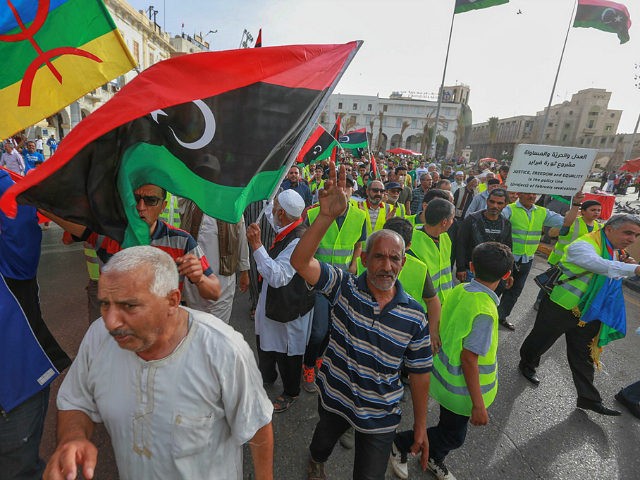The internationally-recognized Libyan government over the weekend accused an armed group loyal to renegade Gen. Khalifa Haftar of shutting off water for two days, ending on Tuesday, to areas in and around Tripoli, further tormenting residents already reeling from weeks of fighting.
In a statement issued Tuesday, the Great Man-Made River company that supplies groundwater from the Sahara declared, “The crisis of halting water supplies has ended and flows have started,” according to the Guardian.
The internationally-recognized Government of National Accord (GNA), based in Tripoli, blamed Haftar for Sunday’s attack on pipelines and wells that ultimately forced workers to shut down water supplies to the Libyan capital, a city of over two million, and surrounding coastal areas. The United Nations condemned the assault for intentionally trying “to deprive thousands of already embattled Libyans of safe drinking water.”
Maria Ribeiro, the U.N.’s Humanitarian Coordinator for Libya, declared that “such attacks against civilian infrastructure … may be considered war crimes.”
On April 4, Gen. Haftar and his Libyan National Army (LNA), fighting on behalf of the breakaway government in eastern Libya’s Tobruk region, launched an offensive to take Tripoli from the U.N.-brokered GNA headquartered there.
The fighting has already killed 510 people, injured 2,467 others, and displaced nearly 80,000, the U.N. reports.
Spelling more misery for residents of the besieged capital, an armed group allegedly linked to Haftar attacked the Shuwairif water pipelines and wells on Sunday.
The assault forced workers to cut water to Tripoli as well as western and central region cities in the North African nation, several news outlets report, citing Libya’s Great Man-Made River Authority.
GNA Interior Ministry officials reportedly said Haftar loyalist Khalifa Hanaish led the gunmen who ultimately blocked the water supplies.
“The ministry added that Hanaish is pressing the government via such sabotage acts to release his brother Al-Mabrouk Hanaish who is arrested on criminal charges – being part of a banned organization – and is now awaiting court ruling,” the Libya Observer notes.
GNA officials reportedly added in the statement:
This isn’t the first endeavor by the same armed group. Tariq Hanaish tried before pressuring the government by kidnapping a South Korean and three Filipinos asking the government to swap them for Al-Mabrouk, but he was dealt with. The foreigners were freed through foreign mediation in coordination with war criminal Haftar which means that he is involved also in the cutting of water supplies on Tripoli to attack the morale of the people living there.
The Guardian points out that Haftar’s link to the attack “has been disputed.”
It explains:
The group who closed off the water supplies claimed to be supporters of Haftar the leader of the Libyan National Army (LNA), but the link has been disputed. There were claims the armed group was operating independently and that the GNA was making a link to undermine support for the controversial general.
Human rights groups have repeatedly accused Haftar’s LNA of war crimes. With the support of Russia, France, Saudi Arabia, the United Arab Emirates (UAE), and Egypt, the Libyan warlord has taken control of most of the North African country, primarily areas in the eastern and southern parts of the nation.
Although the U.S. has mainly shown support for the GNA, it has largely stayed out of Libya’s political infighting, focusing instead on combating jihadis like the Islamic State (ISIS/ISIL) who have found a safe haven in the North African country. U.S. troops pulled out of Libya soon after the Tripoli offensive began.
Haftar’s supporters believe he can restore stability to Libya, which has descended into chaos since the U.S. and NATO-backed removal of dictator Muammar Gaddafi in 2011.
ISIS and other jihadis are expected to capitalize on the deteriorating security conditions fueled by the general’s Tripoli offensive, Ben Fishman from the Washington Institute for Near East Policy and other experts told lawmakers last week.

COMMENTS
Please let us know if you're having issues with commenting.